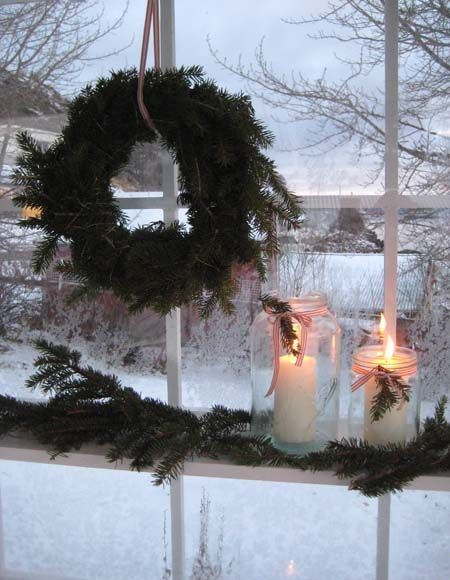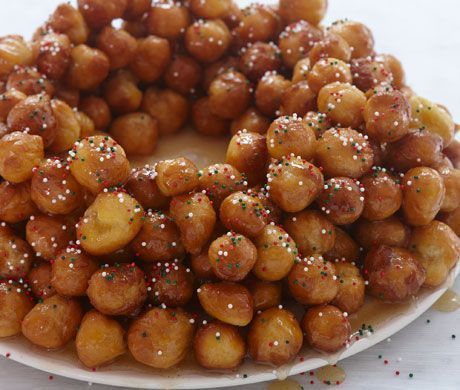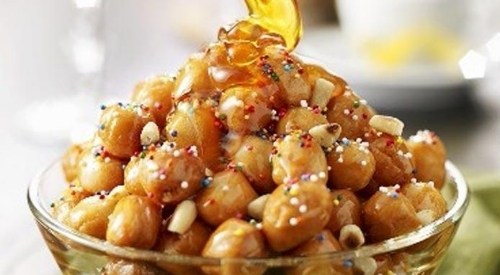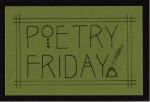
Since I welcomed the new year with two Barbara Crooker poems, it’s only fitting that I share another of her gems for my final Poetry Friday post of 2015. I can’t think of a more life affirming way to bookend this tumultuous year.
 “Making Strufoli” is included in Barbara’s most recent book, Selected Poems (Futurecycle Press, 2015), a striking collection of work first published in various chapbooks and periodicals. As Janet McCann points out in her insightful Foreword, Barbara writes about ordinary life through the lens of an extraordinary sensibility.
“Making Strufoli” is included in Barbara’s most recent book, Selected Poems (Futurecycle Press, 2015), a striking collection of work first published in various chapbooks and periodicals. As Janet McCann points out in her insightful Foreword, Barbara writes about ordinary life through the lens of an extraordinary sensibility.
Though I have never made or eaten strufoli, I could certainly identify with the love-hate relationship we sometimes have with our parents and the mixed feelings which inevitably arise at year’s end, when everything comes to bear and so much is expected of us. Cooking can certainly be a form of meditation, a chance to feed our hungers for validation and understanding just as much as our need for physical sustenance.
*

MAKING STRUFOLI
(a traditional Italian sweet)
In the weeks before my father’s death, I make strufoli for him,
not knowing he will enter the hospital Christmas Eve,
not knowing he will never leave that high and narrow bed.
There are piles of presents yet to be wrapped red or green,
stacks of glossy cards to write, my work abandoned until the new year,
and I’m at the counter, kneading dough, heating olive oil until it spits.
A small blue flame of resentment burns. I’m in the last half
of my life. The poems I haven’t written are waiting
outside the snowy window. But I’m in the kitchen, rolling
dough into fat snakes, then thin pencils. With the sharpest
knife, I cut them into one inch bits—a slice for the prom dress
he refused to buy, the perfect one, in shell-pink satin;
a chop for the college education he didn’t save for—She’s just
a girl, She’ll get married, Who does she think she is?— a stab
for the slap when I tried to learn Italian from his mother,
my grandmother, whose recipe this is. The small pieces hiss
in the bubbling grease. They change into balls of gold. I drain
them on layers of paper towels. I don’t know I will never make
them again, never mix in the roasted almonds, pour warm honey
over the whole pile, sprinkle Hundreds of Thousands, those tiny
colored candies, over the top. I only know the way my shoulders
ache, the weariness as I do the great juggle—family, house, and
work—trying to keep all the balls in the air. And when his stubborn
breathing finally stops, when his heart gives out at last,
I only remember love as something simple and sweet,
a kiss of honey on the tongue. I take this strufoli that no one
else will eat, and spread it on the snow for the starlings and the crows.
~ posted by permission of the author. Copyright © 2015 Barbara Crooker. All rights reserved.
*
From the slicing and hissing of resentment to balls of gold, quite an emotional transformation!
I’m wondering why I never encountered strufoli before reading Barbara’s poem. My former neighbor told me about the “fried dough” she made every Christmas but I don’t recall her calling it ‘strufoli’, only that her family love loved it, and the holidays wouldn’t be the same without it. Are there any Italian grandmothers out there who’d like to adopt me? 🙂
So, strufoli (sometimes spelled with two “f”s), also known as Italian Honey Balls or “the croquembouche of southern Italy,” originated in Naples by way of the Greeks. Marble-size bits of dough are deep fried in oil, drenched in honey, then decorated with colorful hundreds-of-thousands/sprinkles/nonpareils. Candied fruit, nuts and lemon or orange rind are sometimes added. Strufoli are typically mounded into a pyramid or shaped into a wreath, making a beautiful, festive centerpiece for the holiday table. This sweet indulgence, also part of Easter celebrations, symbolizes abundance and good luck. Some think the honey keeps families “stuck” together.

Barbara was kind enough to dig up her grandmother’s recipe just for us and shared these words about her poem and making strufoli:
My memory of making them is somewhat dim, but I believe my grandmother taught my mother, and she taught me. As my parents aged, my mother wasn’t up for doing this any more (frying is quite a production, including clean-up), so I’d make it to have on hand when they came for their Christmas visit.
My dad was a difficult man, who grew up conflicted in an immigrant family, and who distanced himself from his culture. Around the time I was in college, he reconnected with family and heritage, so I’m grateful to have had those years of visits and those stories. He also grew up in a culture that didn’t value women; he couldn’t understand why being a wife and a mother wasn’t enough. And yet he was proud of my writing, and I think his love of gardening and love of food have been a great legacy, and an important part of my life. He’s been gone around twenty years; Mom’s been gone seven, and I miss them both, especially around the holidays.

ANNUNCIATA (EMMA) CUCCARO POTI’S STRUFOLI RECIPE
- 2-1/2 cups flour
- 1/4 teaspoon salt
- 1/2 tablespoon confectionary sugar
- 3 eggs
- 2 egg yolks
- 1/4 cup margarine
- 1 teaspoon grated lemon peel
- 2 cups olive oil (regular, not EVOO)
- 1 cup honey (hers calls for 1-1/2 cups, but I found that to be too much)
- whole almonds
- 1/3 cup multi-colored candies (if you can find them)
On a floured pastry board, heap the flour in a mound and make a well in the center, into which put the salt, sugar, eggs, egg yolks, oleo, and lemon peel. Mix, then knead by hand.
Lightly roll 1/4” thick, then cut into strips 1/4” wide. Roll with the palm of your hand to form shapes the size of a pencil (think Play-Doh “snakes”). Cut into 1/4” pieces.
Fry in hot oil 3-5 minutes until lightly browned. Drain and dry on paper towels. Heat honey on low for 15 minutes. Pour into a large bowl, add fried pastry bits, whole almonds, toss, and let soak for five minutes (this part is mine). Scrape into a mound, and decorate with candy sprinkles. Have lots of Wet Wipes handy if giving to small children!
*
Check out this struffoli-making video from the Academia Barilla to see kneading, rolling, cutting and frying techniques:
* * *
 The clever and delightful Diane Mayr is hosting the Roundup at Random Noodling. Click through to check out out the full menu of poetic goodness on this week’s menu. Only 6 more days till Christmas!!
The clever and delightful Diane Mayr is hosting the Roundup at Random Noodling. Click through to check out out the full menu of poetic goodness on this week’s menu. Only 6 more days till Christmas!!
*
![]() This post is also being linked to Beth Fish Read’s Weekend Cooking, where all are invited to share their food related posts. Put on your Santa caps and holiday aprons, and come join the fun!
This post is also being linked to Beth Fish Read’s Weekend Cooking, where all are invited to share their food related posts. Put on your Santa caps and holiday aprons, and come join the fun!
——————————————–
Copyright © 2015 Jama Rattigan of Jama’s Alphabet Soup. All rights reserved.

I’ve never heard of strufoli either. And that poem. Wow.
LikeLike
Yes, the rich layers in the poem are so telling, aren’t they?
LikeLike
Terrific post. Really enjoyed Barbara Crooker’s poem. Everything is woven perfectly.
LikeLike
She’s a master! Even when she’s tackling difficult subjects we come away feeling renewed and consoled somehow.
LikeLike
I love everything about this post – and I am curious how strufoli are related to pignolata? Regional differences? http://cook123.com/recipes/pignolata-pinulata.html
LikeLike
Good point, Cathy. Must investigate further. I think I remember reading that there are different names for the same basic dessert — as you say, probably regional differences.
LikeLike
What an amazing poem! Dark and lovely Christmas memories, like crows in the snow.
LikeLike
Lovely comparison, Kate. *crows in the snow* — yes!
LikeLike
love the poem, the recipe, the poet, the pictures, and the name, “Annunciata!” Thank you Jama and Barbara, and Happy Christmas season to you!
LikeLike
I thought the same thing when I saw the name “Annunciata.” Beautiful, isn’t it? And of course I heartily second your love for this poem and this poet!!
LikeLike
This one got to me – my dad’s been gone almost 21 years now. Many thanks to both of you for sharing. So many disparate ingredients & emotions – and no small bit of labor – go into recipes and relationships!
Wishing honey-sweet moments to all this season.
LikeLiked by 1 person
Spot on observation, Robyn — recipes and relationships both require care, attention to detail, and doing what you need to do to make things work. Compromise and improvisation are also good skills to practice. 🙂
LikeLike
I love Barbara Crooker’s poems, so consider this gift today a lovely one, Jama. Thank you! Thoughts run heavily through our minds in the ending days of our parents, and Barbara shares that well, doesn’t she? The recipe calls up memories of a grandmother’s leppe cookies, something she made each year, and what her daughters did not. I’ve never heard of strufoli either, but they remind me of fried little donuts that I used to make for my children, not for a long time though. Best wishes to you and yours for a wonderful Christmas and a happy opening of the new year!
LikeLiked by 1 person
I view all of Barbara’s poems as special gifts that keep on giving with each reread. Your grandmother’s leppe cookies sound interesting. I love hearing about family traditions, and that you also made little donuts for your kids. 🙂
LikeLike
That poem! It’s as rich as honey with some lemon peel tang. So glad the dessert isn’t what I thought when I first saw the photo on Diane’s site (garbanzo beans!).
LikeLike
LOL — they do look like garbanzo beans, but also hazelnuts. I think Giada mentioned that strufoli was sometimes made with all hazelnuts, and she likes to also add some hazelnuts with the fried dough balls.
LikeLike
Garbanzo beans? And what did you think the little pink and blue things sprinkled on top were? Just curious… 😉
LikeLike
Food+family+festivities can unfortunately add up to conflict. Crooker’s poem is so powerfully poignant that I was close to tears by the end. Thanks, Jama, for sharing her poem and introducing me to Strufoli (I, too, thought the picture looked like garbanzo beans – yum!) Happy holidays to you and yours. 🙂
LikeLike
‘Tis the season for mixed feelings. I like the central truth in this poem — past hurts can be assuaged by sweet memories.
LikeLike
Love the poem. I grew up with strufoli from my Aunt Mary, but I didn’t really like it. Glad to have the recipe though. My husband likes honey.
LikeLike
Sorry to hear you didn’t like your Aunt Mary’s strufoli. Maybe if you made your own? 🙂
LikeLike
“The poems I haven’t written are waiting
outside the snowy window.”
Always that struggle–to thine own self, or to thine family, be true?
LikeLike
Yes, definitely something we all can relate to.
LikeLike
Powerful poem!
Have a wonderful holiday, Jama!
LikeLike
Happy Holidays to you too, Barb! Glad you liked the poem.
LikeLike
Wow–this poem packs a punch. I think we get awash in sweet memories and difficult memories at this time of year.
LikeLike
Yes – the holidays are a mixture of happy and sad for most people.
LikeLike
The poem is so powerful. Such emotion!
I’d never heard of strufoli, but it sounds and looks delicious!
Happy Holidays, Jama 🙂
LikeLike
I love learning about new foods through poems — this way an emotional context is part of the meal. 🙂
LikeLiked by 1 person
Thank you for another post-feast! Food for eyes, minds, and stomachs, all in one convenient place:) Truthfully, I was content to immerse myself in the opening photo; if I had not scrolled past that image, I would have been fully satisfied.
“The poem.” i don’t usually read others’ comments, but this poem so moved me that I did want to receive the thoughts of others. Diane’s matched mine in terms of the line that I most connected with. I am grateful for her verbalizing the inherent conflict those lines reveal.
All the while I was reading the poem, I (totally non-Italian) was thinking about my first attempt at making calzones. (Lots of calzones…Why go all the trouble for just a few?)….December…holiday festive mood…dough, fillings, sauce, a mess spread out everywhere…phone call…husband rushes out to be with father…father-in-law rushed to hospital…husband eventually comes home from hospital; father-in-law never did…calzones, still in bits and pieces of prep state end up in garbage…desire to make–or even to eat–calzones disappears…though my parents still were alive..at news of my father-in-law’s death, I felt orphaned.
Happy December holy days and holidays! To borrow a quote from Tiny Tim–“God bless us one and all.” …And a special blessing to those missing friends and relatives this year.
LikeLiked by 1 person
Thank you for sharing that poignant memory! I can see that it is still very fresh in your mind. We inevitably think of those we have lost or miss during this time of year. Blessings to you and your family. Let’s all wish for world and personal peace in the coming year.
LikeLike
Amen! Thank you for your great generosity in taking time to share your thoughts and prayers in response to my comments on your post. Every blessing!
LikeLike
The holidays are a complicated time, aren’t they?
LikeLiked by 1 person
Indeed! Hope you enjoy some joyous moments amid the stress and busyness.
LikeLike
Jama, appreciations for my intro. to an enormously talented Barbara Crooker.
Fortunately my fingers + mouth + face have become stuck on this treat made by Nella Annino, my dear mother-in-law who creates all the old recipes, well into her 80s. Fortunately I will taste some of her delicacies, soon, along with those our daughter, a passionate baker, due in no small part to her life growing up in an Italian-American family.
I have heard/seen/been there in enough of these immigrant family moments to say how restorative it is that love endures, forgives, reconnects.
LikeLike
How wonderful to have these delicious family traditions to enjoy during the holidays!! There’s nothing like homemade and family recipes. Lucky you to have firsthand knowledge of strufoli! Happy Holidays!!
LikeLike
What a poem! Such a story. Relationships are so, so, so complicated…
LikeLike
Yes, they are. Barbara tells it true every time.
LikeLike
Another banquet of a post! I bought Barbara’s Selected Poems after reading someone’s PF post about one of her poems a while ago (she’s been a favorite for years).
This is such a layered poem. I shuddered at the “blue flame of resentment,” all the hissing and slicing–it felt downright dangerous. I noticed how this final act of love became mixed into resentment at all the tasks we take on as mothers and daughters. And this finally morphed into love and generosity toward the birds. So like life with its marbled moments.
LikeLike
Beautifully said, Violet. It’s so life affirming to read that the poet found some peace of mind by the end of the poem.
LikeLike
This poem of Barbara’s was heart wrenchingly beautiful. There is something soulful in creating food as well as cathartic. Thanks for a wonderful post.
LikeLike
Soulful and cathartic — yes, perfect words to describe Barbara’s poem!
LikeLiked by 1 person
The poem is beautiful! Funny that even though my grandparents were Italian immigrants, we never had strufoli.
LikeLike
My Italian hairdresser is the same way — I was surprised when she told me she’d never heard of strufoli!
LikeLike
I’ve never heard of strufoli that I can remember. I think I’d like it.
LikeLike
I think I’d like it too! 🙂
LikeLike
Jama, another tour de force! Merry Christmas
LikeLike
Same to you, Carole!
LikeLike
I’ve had croquembouche but not strufoli — the sprinkles make it very festive!
LikeLike
I haven’t tried croquembouche yet, though always admired people who make it. Same goes with strufoli now. 🙂
LikeLike
Wow, those last two lines are like a punch in the heart. In the bittersweet way that poetry so often provides.
LikeLike
I agree. Poetry fits the bill for intense, complex emotions in a condensed space. Barbara did a beautiful job here.
LikeLike
I’ve read Making Strufoli poem before – though I’m not sure where – another Poetry Friday post, I think? It was as powerful then as it was this read. Such honesty is raw and beautiful. Loved the video that went with this. Imagine mixing flour and eggs without a mixing bowl. Yet no mess and no waste. #awe
Have a blessed Christmas, Jama.
LikeLike
That chef made it look so easy, didn’t he? I think we all need resident pastry chefs. Happy Christmas to you too!
LikeLike
So many emotions rolled out in this powerful, poignant poem. Yet it really does come down to this: “I only remember love as something simple and sweet…” Thank you for sharing this, Jama. Wishing you a joyous holiday!
LikeLike
I love that line, that statement about our ability to forgive and focus on the positive. It makes us all pause and think about what really matters in the end.
LikeLike
What a lovely post. I had never heard of struffoli either—that is, until I married into an Italian family (though Steve’s calls it struvela for some reason). You reminded me that we wrote a blog post about it a zillion years ago. http://bit.ly/1Ypf7DM Hope you have a wonderful holiday.
LikeLiked by 1 person
Thanks for sharing your link, Michelle! What fun — I still find it a little odd that candy sprinkles are so often used, but tradition is tradition. I also read about hazelnuts, pine nuts, and other fruits being added. I guess the beauty of a recipe like this is the many variations according to family and region. So do you and Steve make struffoli every year? 🙂
LikeLike
No. I think I made it one other time for my decidedly not Italian though sweets-loving family and nobody liked it much!
LikeLike
What a beautiful post and an amazing poem, Jama. One I can truly appreciate at this stage of my life. Thank you.
LikeLike
Yes, the older we get it seems, the more prone we are to reflection, but luckily forgiveness is something we embrace more readily than when we were younger. At least that’s the case with me.
LikeLiked by 1 person
I really love this poem — thanks for the nice introduction to Barbara Crooker. I used to buy strufoli when I lived in an Italian American neighborhood in Brooklyn. I think it’s time I went back for a visit, and to get some! Merry Christmas, Jama.
LikeLike
You’re lucky to live near an Italian bakery! If we had one, I’d have probably known about strufoli long before now. Merry Christmas to you too!
LikeLike
That is some powerful poetry. I like the honest mix of good and bad, life and death, food and suffering, served up without shame but with reverence. That is a slice of life that I recognize and connect with deeply, as many readers here could. Life is messy, but that’s what wet wipes are for. LOL You’re a star, Jama, and I always enjoy my visits here. I hope your furry friends and you have a fine, prosperous holiday season.
LikeLiked by 1 person
Thanks for your spot-on, insightful comment, Brenda. Barbara does indeed serve up the complexities of life and relationships with due reverence in her poem. Enjoy your holidays!
LikeLike
And you enjoy yours. I hope your family cooks up some yummy treats. 🙂
LikeLike